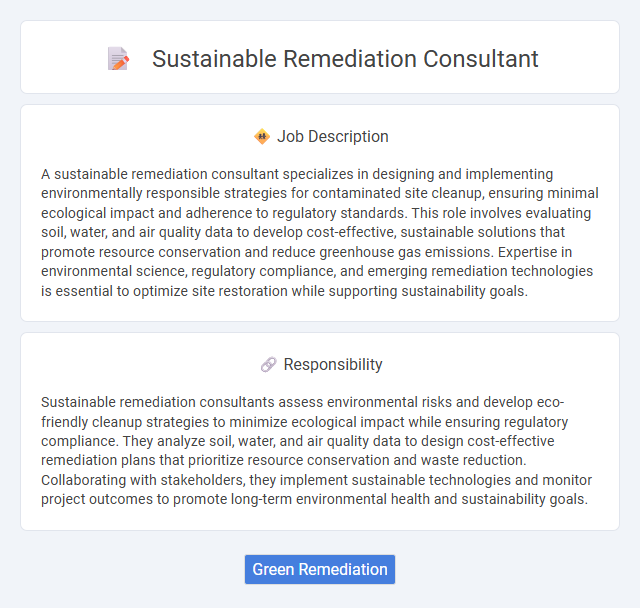
A sustainable remediation consultant specializes in designing and implementing environmentally responsible strategies for contaminated site cleanup, ensuring minimal ecological impact and adherence to regulatory standards. This role involves evaluating soil, water, and air quality data to develop cost-effective, sustainable solutions that promote resource conservation and reduce greenhouse gas emissions. Expertise in environmental science, regulatory compliance, and emerging remediation technologies is essential to optimize site restoration while supporting sustainability goals.
Individuals with a strong commitment to environmental stewardship and an analytical mindset are likely to thrive as sustainable remediation consultants. Those who enjoy problem-solving, interdisciplinary collaboration, and possess knowledge in environmental science or engineering may find themselves well-suited for the role. Candidates with a passion for sustainable development and resilience planning probably have a higher chance of success in this field.
Qualification
Sustainable remediation consultants require expertise in environmental science, engineering, and regulatory compliance to effectively manage contaminated site cleanups with minimal ecological impact. Key qualifications include a degree in environmental engineering or science, proficiency in sustainability assessment tools, and knowledge of green remediation technologies. Certification in environmental management systems and experience with site risk assessment further enhance a consultant's capability to deliver optimized, eco-friendly remediation solutions.
Responsibility
Sustainable remediation consultants assess environmental risks and develop eco-friendly cleanup strategies to minimize ecological impact while ensuring regulatory compliance. They analyze soil, water, and air quality data to design cost-effective remediation plans that prioritize resource conservation and waste reduction. Collaborating with stakeholders, they implement sustainable technologies and monitor project outcomes to promote long-term environmental health and sustainability goals.
Benefit
Sustainable remediation consultants likely enhance environmental outcomes by integrating eco-friendly practices into cleanup projects, which may reduce long-term ecological damage and promote resource efficiency. Their expertise probably supports compliance with evolving regulations, helping companies avoid penalties and improve public relations. This role may also contribute to cost savings through sustainable methods that minimize waste and energy use during remediation.
Challenge
Sustainable remediation consultants likely face the challenge of balancing environmental impact reduction with the economic and technical feasibility of cleanup projects. They may need to navigate complex regulatory frameworks and rapidly evolving sustainability standards. The probability of encountering site-specific constraints that complicate the implementation of sustainable practices could further increase project difficulty.
Career Advancement
Sustainable remediation consultants play a critical role in integrating environmental sustainability into remediation projects, driving innovation and compliance with evolving regulations. Career advancement in this field often involves gaining expertise in renewable technologies, environmental risk assessment, and policy development, leading to leadership roles such as project manager or sustainability director. Professionals who build strong networks and demonstrate measurable environmental impact through efficient remediation strategies are highly sought after for senior positions in consulting firms and environmental agencies.
Key Terms
Green Remediation
A Sustainable Remediation Consultant specializes in applying green remediation techniques to minimize environmental impact during site cleanup and restoration projects. Their expertise includes evaluating and implementing renewable energy solutions, waste reduction strategies, and eco-friendly technologies that promote resource efficiency and reduce carbon footprints. These consultants ensure compliance with environmental regulations while advancing sustainability goals in contaminated land management.
 kuljobs.com
kuljobs.com